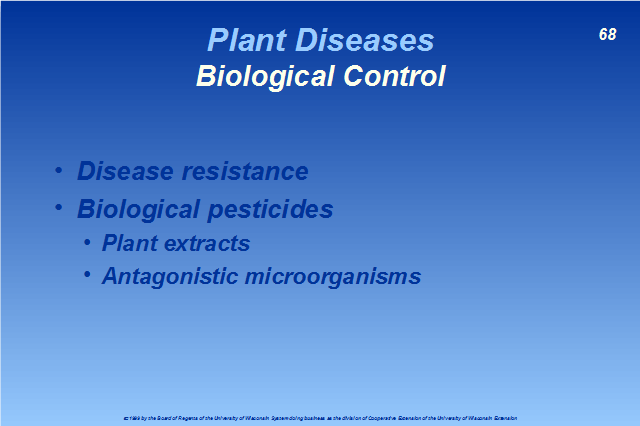

Play narration:
DISEASE CONTROL - BIOLOGICAL CONTROL
The third major category of plant disease control is biological control.
DISEASE RESISTANCE
The classical form of biological control is use of disease resistant plants. While common in agricultural settings, disease resistant plants are less common in ornamental crops. When disease resistant varieties are available, choose them carefully. Ask questions.
To which diseases is this variety resistant? You want to choose varieties that are resistant to the diseases common in your area.
How was the resistance tested? You should look for disease resistance that has been tested in several sites, over several years and under a variety of weather conditions. Plants tested in this manner are more likely to be resistant in your garden, under your environmental conditions, than those tested for a single year and in a single site.
Keep in mind that disease resistance is relative. Some plants that are resistant under certain environmental conditions will not be resistant under other, more extreme environments. Prime examples are powdery mildew resistant Phlox varieties. In a normal year, these varieties exhibit a high level of powdery mildew resistance. However, during extremely wet years, these varieties may not perform that differently from powdery mildew susceptible varieties.
Also keep in mind that resistance is not forever. Varieties that are resistant today, may not (and probably will not) be resistant many years down the road. Pathogens are very plastic. Once resistant varieties are introduced, these varieties tend to select for variants (sub-populations) of the pathogen that can overcome the resistance. Fighting diseases using resistant varieties is an ongoing battle.
BIOLOGICAL PESTICIDES
Biological pesticides are similar in many ways to chemical pesticides. They are products that are applied to plants in order to control plant diseases, but are biological, rather than chemical, in origin. Some biological pesticides are plant extracts that are inhibitory to growth or reproduction of plant pathogens. More commonly however, biological pesticides are composed of microorganisms (bacteria or fungi) that either antagonize or compete with pathogens, thus preventing or at least reducing disease.